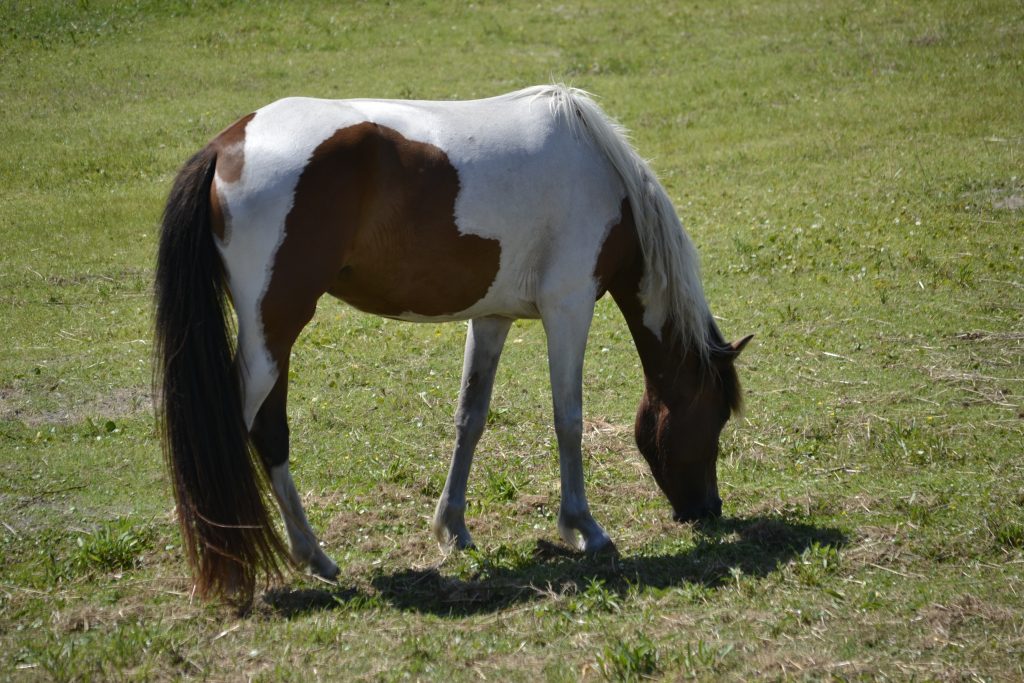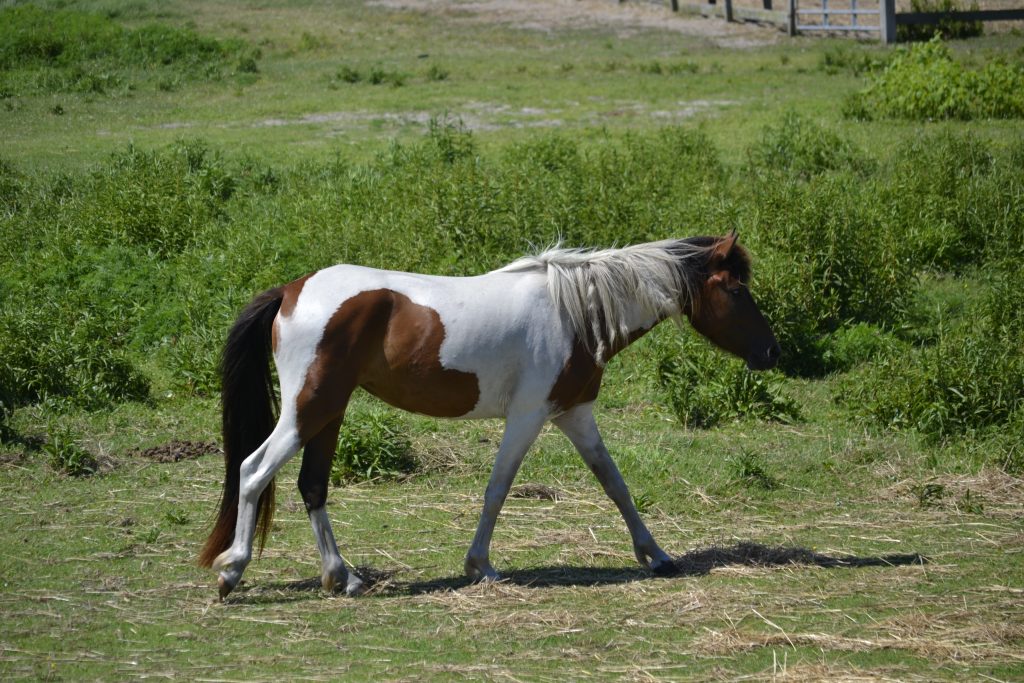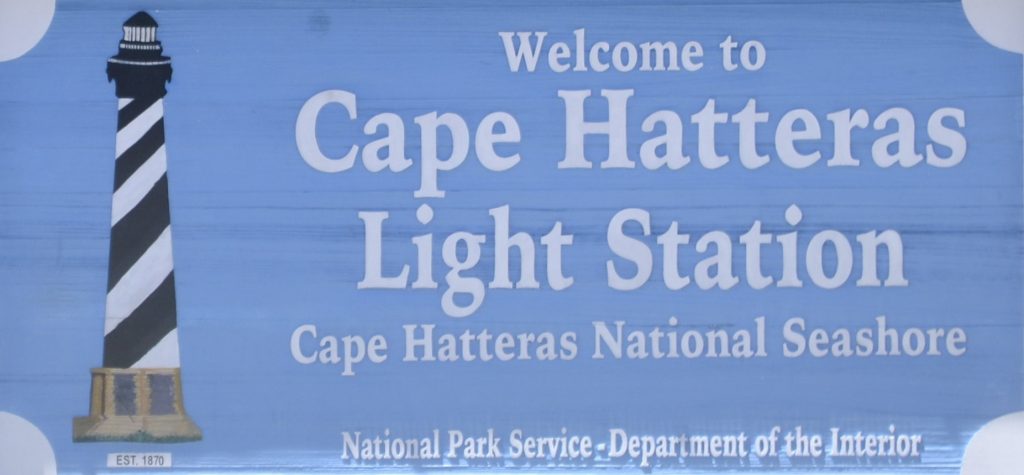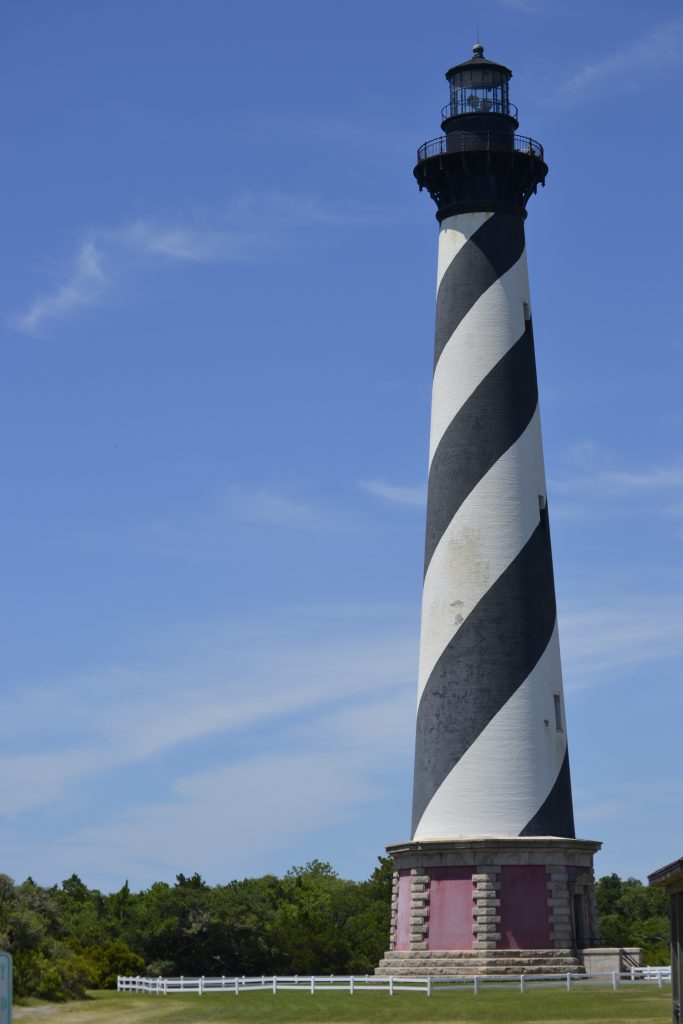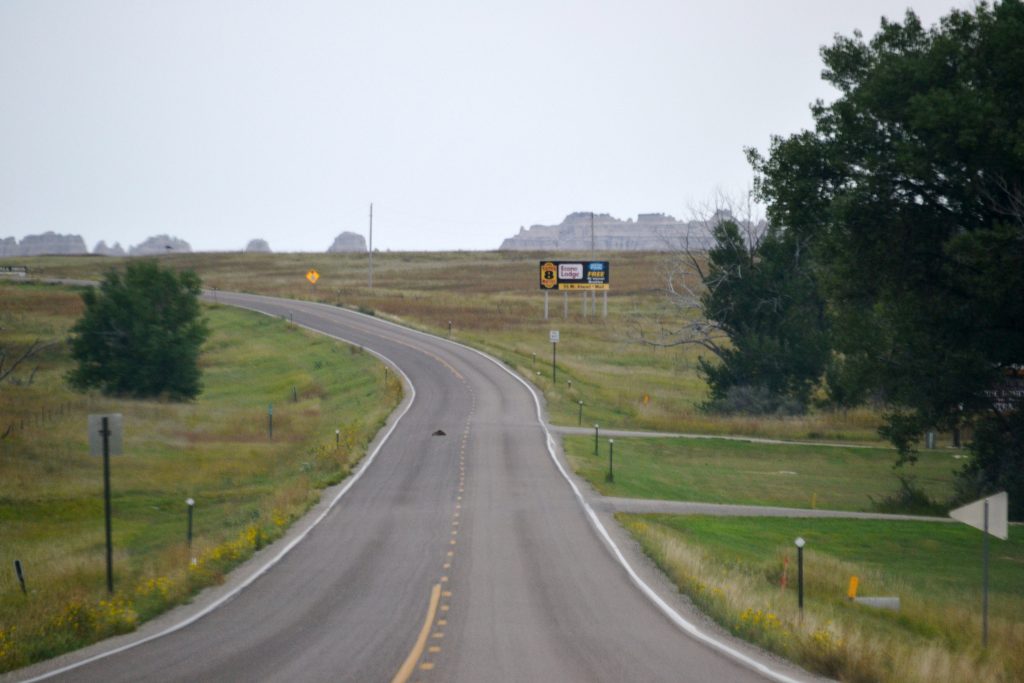
Approaching the Badlands on Interstate 90, I began to notice the fascinating geological formations that makes up this unique region of the United States. I realized soon that I would be reaching the highway exit to the entrance of Badlands National Park, one of the several national parks I would be visiting on my ten-day vacation.
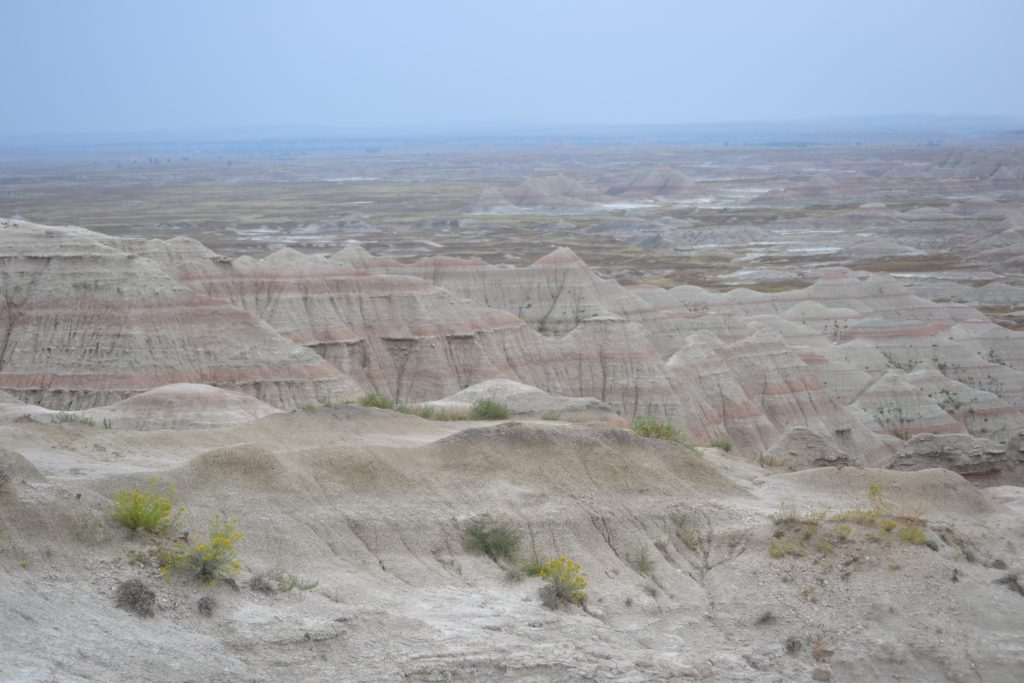
The exit to access the Badlands heading west on I-90 is Exit 131 (Interior) which leads to Badlands Loop Road (Highway 240), one of the country’s most beautiful drives. My plan was to purchase the annual National Park Pass which would allow me entrance to several of the national parks I had scheduled to visit on this trip.
Within minutes upon entering the Badlands National Park, I noticed the scenic trail providing 180 degree views of the Badland’s geology. A fairyland of soaring spires and pinnacles, the landscape is layered in spectacular color as a result of years of water erosion and is best viewed from the White River Valley Overlook. Running more than sixty miles in length, I had come across “The Badlands Wall”. Dividing the upper and lower prairies, the wall is in a state of attrition, washing away into the White River Valley. I followed this wall along The Loop Road making frequent stops along the route and taking in the magical scenery and enjoying its short hikes.
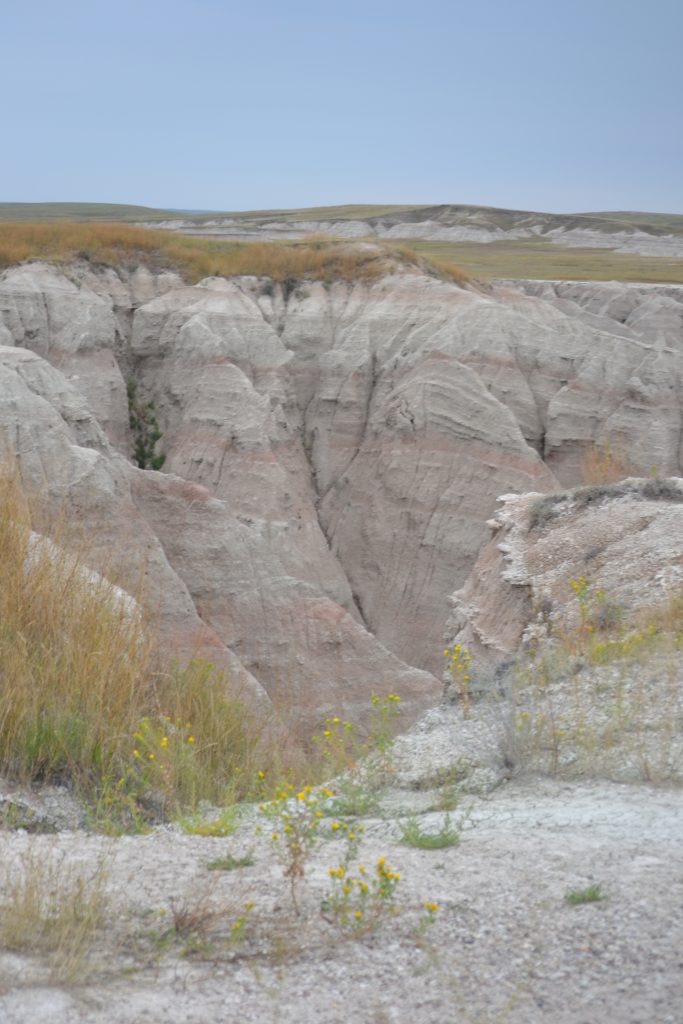
The temperature continued to drop, and with a mist in the air, the park gave off an eerie vibe. The boardwalk to the first overlook had a thin layer of ice and I noticed tourists sliding along the wooden planks careful not to lose their balance. I had expected more visitors at the park by mid-morning, but realized that the weather may have kept them away and although the weather was to reach a high of 70 degrees, there was a threat of thunderstorms ahead. The Badlands are known for its unpredictable hailstorms and sudden rain during the summer.
Taking in the view, I imagined the region during prehistoric times when the area was submerged beneath an ancient sea. Over time, the sea receded and the land would become inhabited by saber-tooth tigers and three-toed horses. Today, its rolling, rounded hills look like the perfect backdrop for a Star Wars movie with its colorful hues and sparse vegetation.
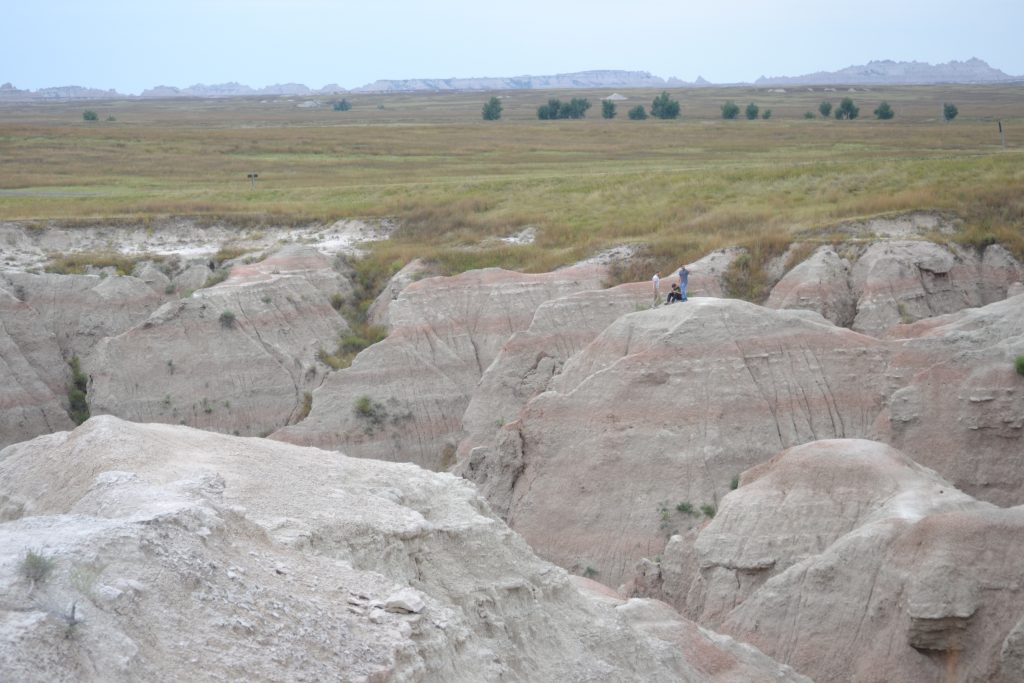
Looking out onto the horizon, I could hardly see the group of hikers relaxing on one of the Badlands’ formations. The contrast between man and rock provided a new perspective of my surroundings where everything looked miniature. This view brought about a realization of just how small I was against this vast, amazing landscape.
I had planned on spending at least three hours touring the park and hiking some of the trails. I estimated that it would take about an hour to drive the loop road while most of the hikes were no longer than a mile, ranging from easy to moderate in level of difficulty.
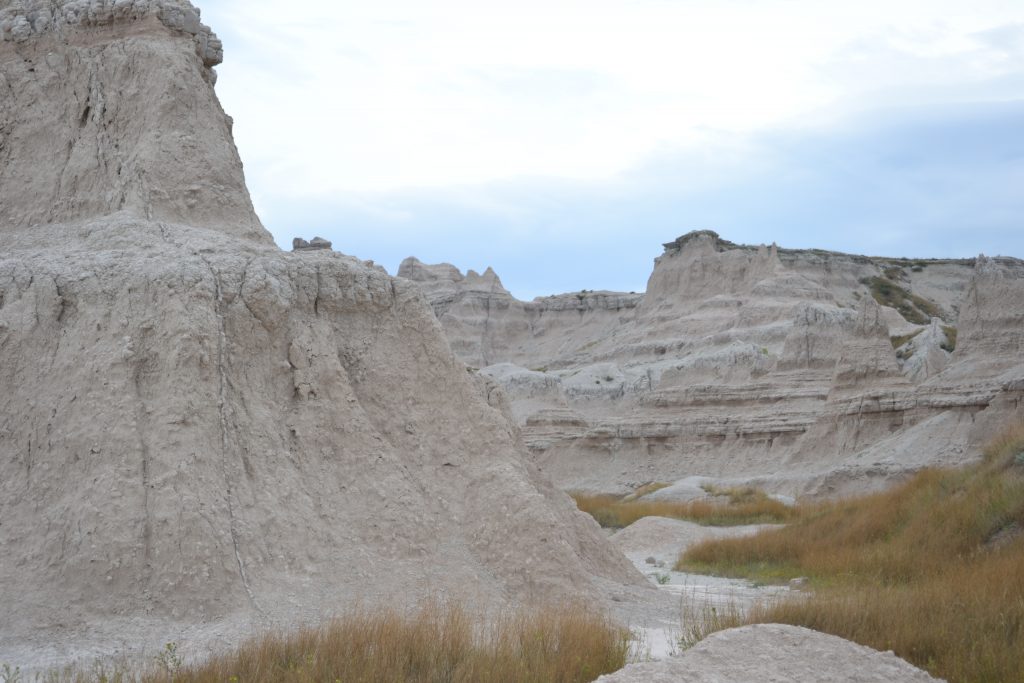
As a result of years of erosion from wind and rain, the Badlands contain a large number of spires, hoodoos, canyons, bluffs and other interesting formations. Once inhabited by the Lakota Indian tribes, it was the French Traders who gave this area its name, “mauvaises terres”, which translates to “Bad Lands”.
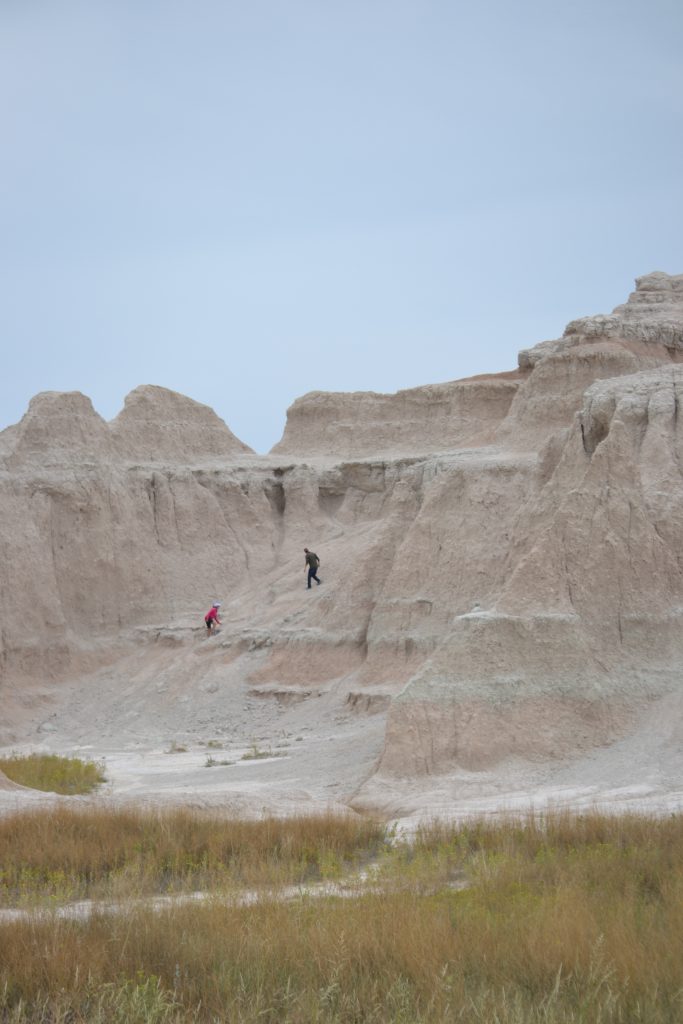
Scientists have found fossils of prehistoric mammals throughout the park, many of which were displayed on the Fossil Exhibit Trail. Several other trails lead into the interior for an up close exploration of the Badlands ecology and ecosystems. My favorite trails included the Door Trail, a .75 mile boardwalk path leading to a break in the Badlands Wall and the Window Trail departing from the same trailhead passing a natural window in the Badlands Wall opening up for a view of the canyon.
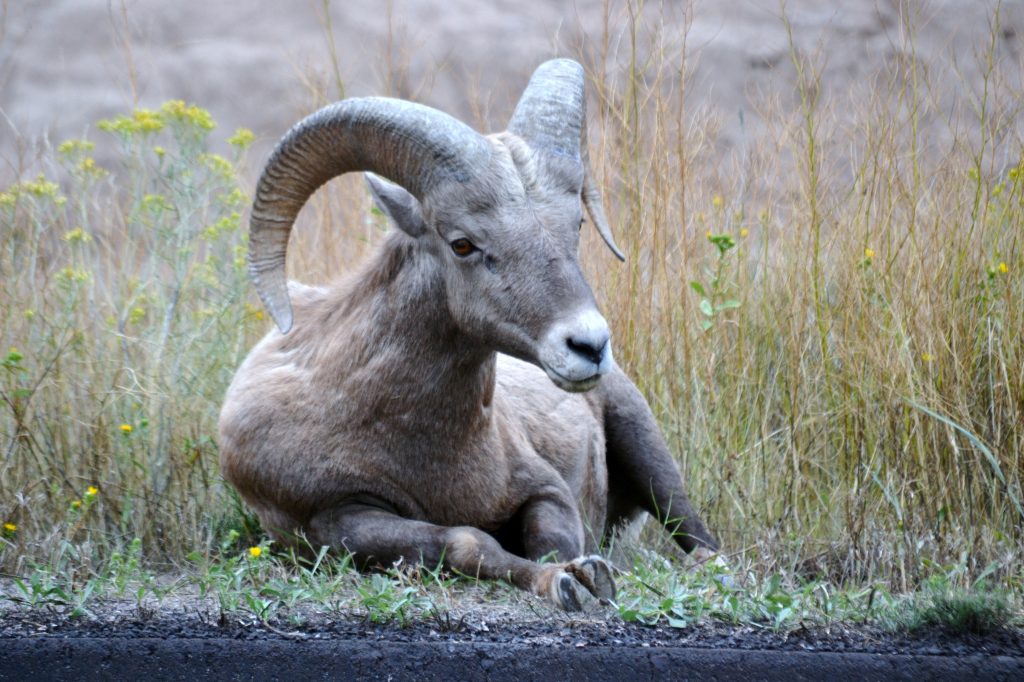
I enjoyed the short jaunts and continued my drive on Dillon Pass where I noticed several cars pulled over to the side of the road. I was so surprised to notice a bighorn sheep resting a short distance from where we had parked and it was one of the most beautiful sights I had ever seen. Seeing wildlife in its natural habitat is exhilarating, but I knew I had to keep my distance.
Bighorn sheep are not the only animals that make the Badlands their home. According to the National Park Service, there are coyotes, porcupine, bobcat, black-tailed prairie dog communities, herds of American bison, pack of red wolves, prairie rattlesnakes, mule deer, black-billed magpies, swift fox and black footed ferrets.
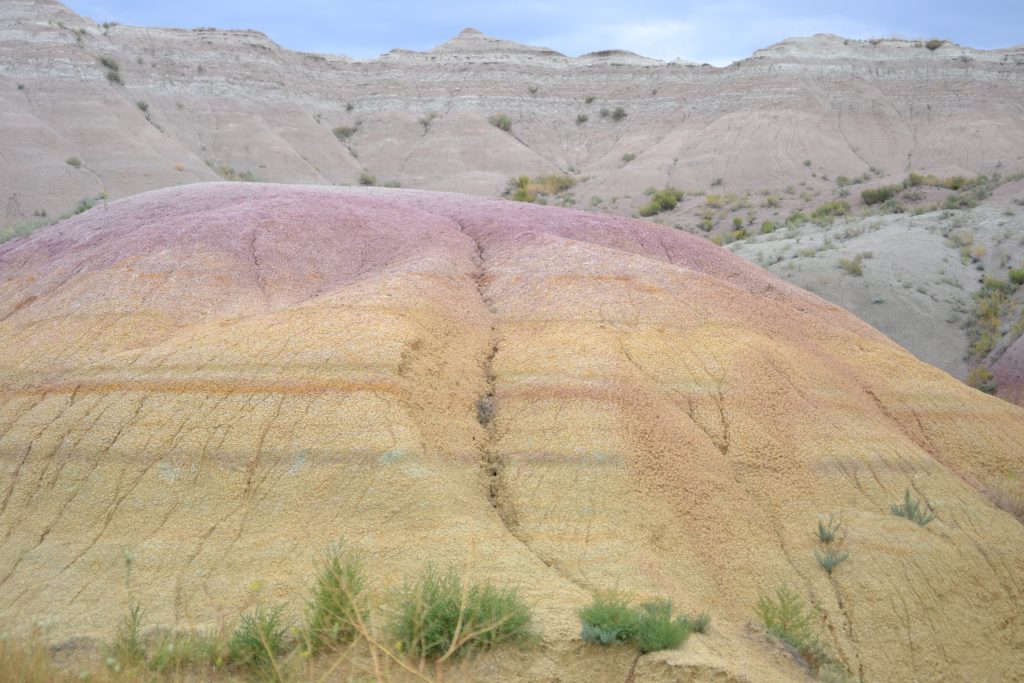
I found it difficult to break away from the bighorn sheep, but the Yellow Mounds Overlook was just around the bend where I would be able to see the spectacular striations of colors on the Badlands formations. From blue coal to red scoria, my favorite colors among the stria were pink and gold.
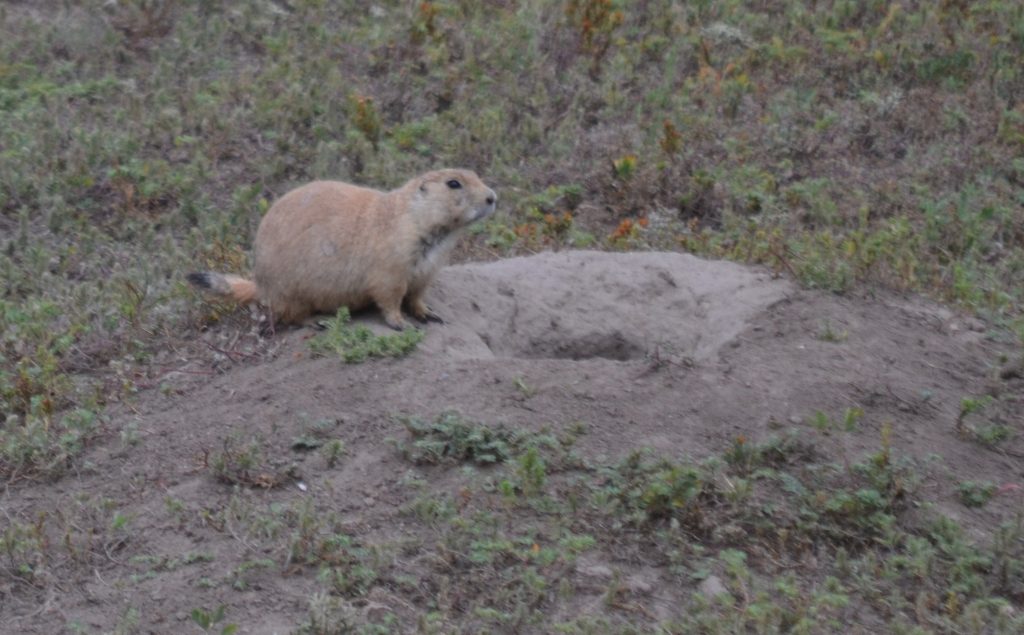
Located off of Sage Creek Rim Road, I looked forward to visiting Roberts Prairie Dog Town. I immediately fell in love with the active prairie dogs and their cute little mannerisms. They were energetic, hopping in and out of their dens, mounds of dirt with entrances on the top. Kicking up dust while digging holes, these little critters would pause only for a moment to let out a little chirp to warn of danger. Posted signs warn humans that these seemingly docile little animals carry disease and touching them is prohibited.
It was an exciting visit to Badlands National Park and I was most excited about seeing all of the wildlife and ecological formations. Geologists predict that, in a half a million years, the Badlands will be gone. I was so glad to have the opportunity to explore this spectacular park and overjoyed with the animal encounters.
For more information about the park, visit the Badlands National Park website and stop by the Ben Reifel Visitor Center to browse the displays.
Have you had the opportunity to visit Badlands National Park? Did you hike or see any of the wildlife that live here? I would love to hear about your adventure if you would kindly leave a message in the comments section below! Many thanks for reading my post about my day at Badlands National Park and wishing you many and Happy Travels!
Badlands National Park is located in the state of South Dakota. Entering the Badlands from the East, I was able to program the following address into my GPS: 21020 SD Highway 240, Interior, South Dakota 57750. For more information about the park, visit the National Park Service website at www.nps.gov and search for the Badlands National Park.
What to See and What to Do:
Badlands National Park
25216 Ben Reifel Road
Interior, SD 57750
Telephone: 605 433 5361
- Admission Fee: All fees are valid for 7 days which includes a $20 fee for private vehicle, $10 for motorcycle, and $10 per person for individuals hiking, biking, etc.
- Hours: Open daily, 24 hours; The Ben Reifel Visitor Center is open from 8AM – 4PM during winter hours; open from 8AM – 5PM April & May; open from 7AM to 7PM during the summer hours and open 8AM – 5PM early September to late October. Closed on Thanksgiving, Christmas Day and New Year’s Day.
- Amenities: visitor center, scenic drive, ranger programs, guided hikes, exhibits, campground, scheduled tours, audio guides are provided in 10 languages, special exhibitions, restaurant, cafes, shops
- Scenic View: The incredible geological formations throughout the park are incredibly scenic along the 38-mile Badlands Loop Road (Hwy 240) as well as the wildlife. For a panoramic view of the White River Valley, hike the mile and a half Notch Trail. Climb the log ladder up a cliff which leads to the top of a butte. A notch in the canyon allows photographers the opportunity to capture the perfect photo. Stick around for sunrise or sunset to photograph the beauty of the Badlands’ strata of color. Other trails include the Fossil Exhibit Trail and the two-day Sage Creek Trail.
- Length of Visit: At least 2 hours but up to 2 days to explore the whole park.
- Tips for Your Visit: The best time to visit the park is during the spring and fall months when the number of visitors is much lower than summer. The South Unit’s White River Visitor Center is only open during the summer months, so check its hours of operation at the Ben Reifel Visitor’s Center. Wear comfortable shoes for hiking and be on the lookout for rattlesnakes. The restrooms are scattered, so use them when you can. Stay on the trails and be careful when walking out into the formations. Trails can be slippery after rain or snow, so proceed with caution along some of the park’s sheer cliffs.
Where to Stay:
Days Inn, Sioux Falls Airport
5001 North Cliff Avenue & 1-90, Exit 399
Sioux Falls, SD 57104
Phone: 605 331 5959
Rate: 66.56 (AAA rate) + tax = 76.88 (includes $2 lodging tax)
Hotel Rating:
The hotel is acceptable for a short stay. Although the rooms are very dated and the furniture is stained, the rooms are clean. Smelled like cigarette smoke, but the air conditioning worked great. It is close to Falls Park and various fast food and dining in restaurants. Did not stay late enough for breakfast.
Badlands Inn, located at the park near the Ben Reifel Visitor’s Center, is the perfect front row seat for Badlands sunrises and sunsets.
Where to Eat:
Red Rock
506 Glenn Street
Wall, SD 57790
Telephone: 605 279 2388
A steakhouse with specialties such as Buffalo Steak, Prime Rib and Walleye Dinner. A little on the pricey side, but there are several options.
Badlands Saloon & Grille
509 Main Street
Wall, SD 57790
Telephone: 605 279 2210
I hear the steak with whiskey glaze is worth a try and the Angus burgers come highly recommended.
What to Eat:
- Buffalo: A meat substitute for beef which is much healthier to eat.
- Chokecherries are a Native American cherry that is made into jam, preserves, butter, wine, jelly and sauce. Wojapi is a chokecherry sauce.
- Dakota Martini is made of three-fourths beer and one-fourth tomato juice
- Fleisch Kuchele is a meat pie originating from Germans who lived in Russia. The dough is filled with meat and onions, then deep fried until the pastry is hot and flaky.
- Hot Beef Commercial, also known as hot beef sandwich, beef combination, hot beef combo and hot beef combination. This is a sandwich made of real mashed potatoes and chunks of seasoned roast beef sandwiched between two pieces of white bread and smothered with homemade gravy until it floods the plate.
- Indian Fry Bread is the state bread of South Dakota, a recipe of the local Indians.
- Indian Tacos are made with a specially spiced beef and beans, cheese, lettuce, sour cream, tomatoes, onion, black olives and house made picante sauce on the top.
- Kolache is an amazing Czech dessert made from pastry and filled with fruit filling such as apple, cherry, lemon, apricot, prune and strawberry.
- Kuchen is German for cake and in South Dakota, visitors can enjoy this pastry filled with custard and fruit.
- Lefse is a flat potato bread coming from Norwegian-American origin and served with butter
- Mocha Cakes, also known as Blarney stones, are square or rectangular blocks of light and airy white cake. Frosted on all sides with vanilla buttercream, they are rolled in lightly salted crushed peanuts for ideal flavor and texture.
- Pasties are savory hand pies.
- Tiger Meat is South Dakota’s answer to steak tartare.
- Wasna is a buffalo and berry dish passed down by the Lakota Indians.
- Zebra Donuts are marbled chocolate and vanilla donuts that is fried, dunked in sweet glaze and hand-dipped in homemade chocolate frosting which feeds 15.
What to Read:
- Death Where the Bad Rocks Live, by C.M. Wendelboe
- Badlands, by C.J. Box
Photo Guide for the Badlands:
- Photograph the sunrise at Badlands Overlook
- Hike the short trails for beautiful views
- Badlands Wall on the Door Trail
- Notch Trail: climb the ladder for outstanding views
- Natural window on the Window Trail
- White River Valley Overlook
- Panorama Point for the sunrise
- Yellow Mounds Overlook for phenomenal colors
Stay tuned as I explore Mount Rushmore, Custer’s Wildlife Loop Road and the Peter Norbeck Scenic Highway!
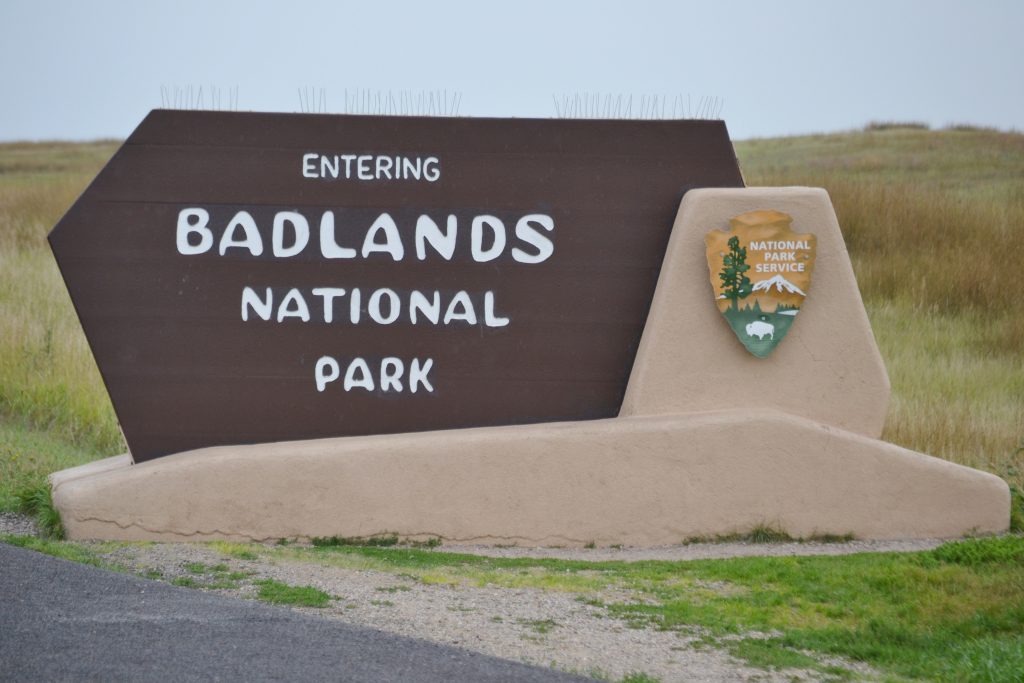
Entering Badlands National Park
